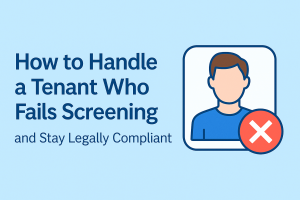
How to Handle a Tenant Who Fails Screening (and Stay Compliant)
Use this step‑by‑step process to reject an applicant legally and professionally. We’ll cover Fair Housing, FCRA Adverse Action Notices, communication scripts, and record‑keeping.
1) Confirm the Reason for the Rejection
Before acting, compare your decision to your written rental criteria and ensure the outcome is consistent.
- Credit score below your minimum
- Income below your income‑to‑rent ratio
- Eviction history or serious delinquencies
- Relevant criminal convictions (evaluate case‑by‑case)
- Incomplete, inconsistent, or falsified application
Apply the same criteria to every applicant to avoid discrimination claims.
2) Follow Fair Housing Rules
The Fair Housing Act prohibits discrimination based on race, color, national origin, religion, sex, familial status, or disability. Use objective standards and apply them uniformly.
3) Send an Adverse Action Notice (FCRA)
If your decision relied on a consumer report (credit, criminal, eviction), the FCRA requires an Adverse Action Notice including:
- CRA name, address, and phone
- Statement that the CRA didn’t make the decision
- Right to a free copy of the report within 60 days
- Right to dispute inaccurate or incomplete info
Most screening platforms provide templates. Keep a copy for your records.
4) Notify Promptly and Professionally
Communicate quickly and clearly. Be courteous, avoid arguments, and don’t provide unnecessary detail.
Email Script
Hello [Applicant Name],
Thank you for your interest in renting [Property Address]. After reviewing your application and screening report, we will not be moving forward.
This decision was based on information from a consumer reporting agency. Please see the attached Adverse Action Notice for details about your rights and how to obtain a copy of your report.
Sincerely,
[Your Name / Company]
5) Keep Records
Store the application, screening reports, correspondence, and a copy of the notice. This demonstrates compliance if your decision is challenged.
6) Handle Application Fees Appropriately
If a report wasn’t run, refund promptly. If the fee paid for screening, you may retain it; clarify what the fee covered.
7) Periodically Review Your Criteria
If many applicants fail for the same reason, reassess whether your standards are reasonable for your market while maintaining fairness and risk controls.
Make Rejections Rare — Screen Right the First Time
Get fast, compliant checks with credit, criminal, and eviction data, plus built‑in Adverse Action support.
FAQs
Do I have to send an Adverse Action Notice?
Yes, when your decision is based in whole or part on a consumer report. Include CRA contact details and the applicant’s rights to a free copy and to dispute.
Can I deny based on criminal history?
Evaluate case‑by‑case, considering nature, severity, and recency. Criteria should be tied to safety or property risk; avoid blanket exclusions.
How long should I keep screening records?
Many landlords keep records for several years. Follow state rules and seek legal advice for retention policies that fit your business.
Disclaimer: This guide provides general information and is not legal advice. Always follow your state and local laws and consult qualified counsel.

